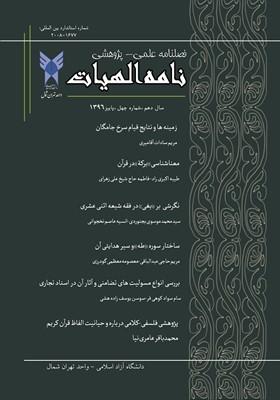نقش علم اجمالی در تعیین فعلیت احکام از دیدگاه آخوند خراسانی و امام خمینی( ره)
محورهای موضوعی : نامه الهیات
1 - دکترای تفسیر تطبیقی
کلید واژه: امام خمینی(ره), علم اجمالی, وجوب موافقت قعطیه, حرمت مخالفت قطعیه, آخوند خراسانی(ره),
چکیده مقاله :
در علم اصول، علم به دو دسته تفصیل و اجمال تقسیم می شود. این دو علم در بیان و کشف احکام شرعی کمک شایانی به مجتهد و فقیه می کند. علم تفصیلی، به معنای مشخص بودن اصل تکلیف است، اما علم اجمالی به معنای علم به جامع همراه با شک در جایگاه استقرار آن است. پس در این که این علم به میزان جامع تکلیف آوری آن مشخص است، اتفاق نظر وجود دارد اما تکلیف آور بودن علم اجمالی نسبت به بیشتر از جامع مورد اختلاف است. حال سوال این است که وجوب موافقت قطعیه یا حرمت مخالفت قطعیه درعلم اجمالی، از دیدگاه آخوند خراسانی و امام خمینی چه تاثیراتی در تعیین فعلیت احکام دارد. بررسی توصیفی تحلیلی این مسئله، نشان می دهد آخوند خراسانی(ره) در علم اجمالی، فعلیت من جمیع الجهات باشد، پس مخالفت قطعیه اش حرام، و موافقت قطعیه اش واجب است. ولی اگر علم اجمالی فعلیت لامن جمیع الجهات داشت، علم اجمالی در هر دو مقام شامل تکلیف آوری می شود. امام خمینی(ره)برخلاف مرحوم آخوند(ره) معتقد است با موجود شدن علم اجمالی در وجوب موافقت قطعیه، مخالفت قطعیه حرام بوده و موافقت احتمالی کفایت می کند. یعنی نیازی به ترک همه اطراف موضوع نیست. این امر موجب می شود در صورت تزاحم با مفسده قویتر، جواز عمل قبیح نباشد.
In the science of principles, science is divided into two categories of details and conciseness. These two sciences help the mujtahid and the jurist in expressing and discovering the religious rules. Detailed science means that the principle of the task is clear, but concise science means comprehensive knowledge with doubt in its place of establishment. So, there is a consensus that this science is as comprehensive as its homework, but the task of concise science is more controversial than more comprehensive. Now the question is what are the effects of the necessity of definite agreement or the sanctity of definite opposition in general science, from the point of view of Akhund Khorasani and Imam Khomeini in expressing the rulings. A descriptive-analytical study of this issue shows that Akhund Khorasani (RA) in general science, my act is in all respects, so his definite opposition is forbidden, and his definite agreement is obligatory. But if the concise knowledge of Lamen's actuality had all aspects, the concise knowledge in both positions includes task-making. Imam Khomeini (ra), unlike the late mullah (ra), believes that with the existence of concise knowledge in the necessity of definite agreement, definite opposition is forbidden and a possible agreement is sufficient. That is, there is no need to leave everyone around the issue. This makes it not permissible to commit an ugly act in the event of a conflict with a stronger corruptor.
_||_

